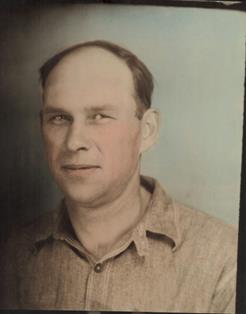52 Ancestors in 52 Weeks, No. 3, Owen Herbert Reed (1896-1935)
 My grandfather died all too soon, and I never knew him. During the Depression, he left behind a wife, a daughter, and five young sons. Even today, I find the sad story hard to tell.
My grandfather died all too soon, and I never knew him. During the Depression, he left behind a wife, a daughter, and five young sons. Even today, I find the sad story hard to tell.
Owen Herbert Reed began life on December 6, 1896 on a farm in the Ozarks. He was the eleventh and last child of his father Samuel. His mother Anna Petronellia was the second wife. Like all his older brothers, my grandfather was always known by his middle name.
His family lived near Mansfield, Missouri, not too far from Laura Ingalls Wilder. They farmed and raised hogs until Herbert reached the age of seven. Then his parents divorced. The father left the area, the mother remarried briefly, and the boys all went out to the neighboring farms to work. No more schooling for them.
Despite this hard beginning, Herbert grew into a tall, happy young man with a cheery, friendly manner. By the time he reached young adulthood, he decided to follow his siblings away from southern Missouri. His father had taken up work as a ranch hand near Hyannis, Nebraska, and two of his brothers, Carter and Aaron, homesteaded together nearby. A sister, Bertha, had married a local Nebraska rancher named Henry Evert. Herbert joined the Everts in western Nebraska and married the rancher’s niece, my grandmother Grace, in 1918.
Together they had six children. The eldest was a daughter, Hazel, and the rest were boys named Owen, Robert, Harold, Earl, and Donald. Herbert worked for his sister and brother-in-law on the Evert ranch until about 1925.
By then, another of his brothers, Morton, had become the railroad station agent in Wheatland, Wyoming. Herbert relocated his young family there to take a job working as the freight agent at the station. All went well as long as the economy hummed along. In 1929 the family even traveled back to Missouri to visit Herbert’s mother.
As the Depression of the 1930’s worsened, the railroad finally had to cut back. Herbert lost the freight agent job. Luckily, his brother Morton helped him secure new employment as a truck driver. He liked to drive and owned a car.
On Independence Day weekend in 1935, Herbert drove to Denver, Colorado to pick up a load of fruit. His boys looked forward to his return on July 6 because he had promised them some of that fruit. To pass the time as they waited, they went off to spend the afternoon at the movies. My dad was seven years old.
Part way through the movie, a neighbor lady came into the theater to tell them they were needed at home. There they learned the sad news that their father’s truck had gone off the road near Brighton, Colorado. The load in the truck had shifted, killing him instantly at the age of thirty-eight.
His funeral took place at the Congregational Church in Wheatland, and he was buried in the Wheatland Cemetery. Family members from Nebraska attended. They were stunned at the loss of their baby brother.
Herbert’s older children remembered him as a playful father. He would swing them by his bent, stiffened ring finger, injured in childhood when his brother Aaron swung at him with a hatchet. The younger boys regretted that they had no real memory of their dad.
I, too, regret that I never had the chance to know him. My own father has often wondered how different his life would have been if his father, and the family breadwinner, had not died so young.